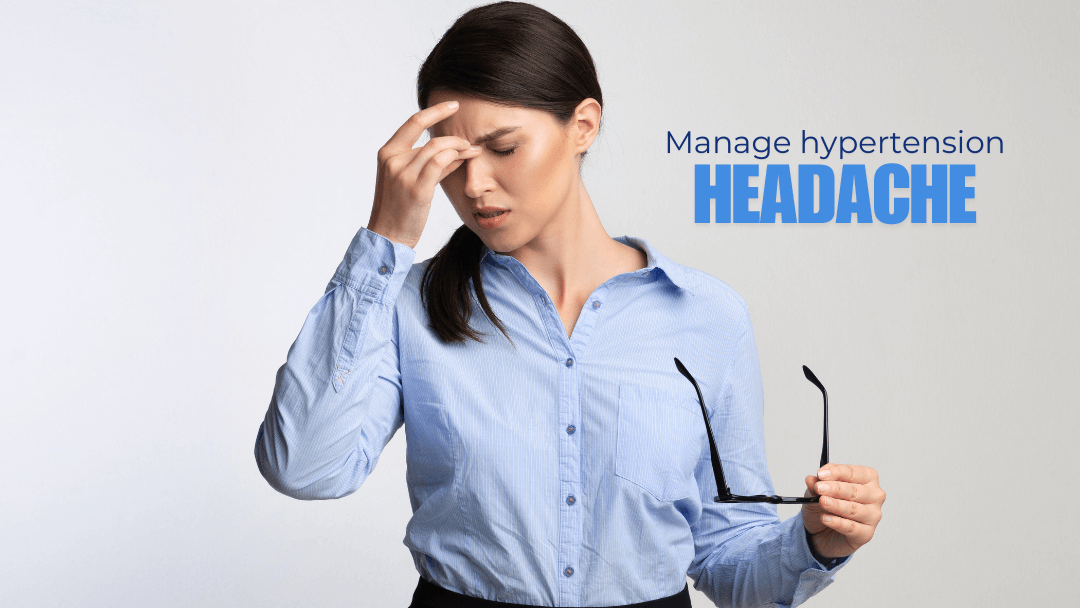Dealing with a hypertension headache is hard. These headaches often come with high blood pressure. We’ll look at fast ways to ease the pain and lower blood pressure.
We’ll cover simple home remedies and medical treatments. You’ll find options for managing hypertension pain that work.
Understanding how to reduce blood pressure headaches is key. We’ll talk about immediate relief and natural methods. You’ll learn how to feel better fast.
Whether you’re looking for relief at home or need to know when to see a doctor, we’ve got you covered.
Remember, quick fixes are helpful, but managing your blood pressure long-term is key. We’ll discuss lifestyle changes and prevention strategies. Let’s explore effective ways to tackle hypertension headaches and get you feeling better.
Key Takeaways
- Act quickly to manage hypertension headaches
- Try immediate relief techniques at home
- Explore natural remedies for blood pressure control
- Know when to seek medical help for severe symptoms
- Adopt lifestyle changes for long-term headache prevention
- Monitor your blood pressure regularly
- Combine quick relief methods with ongoing health management
Page Contents
- Understanding Hypertension Headaches and Their Causes
- Immediate Relief Techniques for Hypertension Headaches
- Natural Remedies to Lower Blood Pressure and Reduce Head Pain
- How to Get Rid of Hypertension Headache
- Diet and Nutrition Tips for Managing Hypertension Headaches
- Exercise and Physical Activity Guidelines
- Stress Management and Relaxation Methods
- When to Seek Medical Attention
- Prevention Strategies for Future Episodes
- Lifestyle Changes for Long-term Management
- Conclusion
- FAQs
Understanding Hypertension Headaches and Their Causes
Hypertension headaches can be a sign of serious health issues. These headaches often stem from high blood pressure, causing pain and discomfort. Let’s explore the connection between blood pressure and headaches, common triggers, and warning signs.
The Link Between High Blood Pressure and Headaches
Blood pressure and headaches are closely related. When blood pressure rises, it can lead to pain in the head. This happens because the extra pressure puts stress on blood vessels in the brain. People with hypertension may experience more frequent and severe headaches.
Common Triggers of Hypertension Headaches
Several factors can trigger hypertension headaches:
- Stress and anxiety
- Lack of sleep
- Dehydration
- Certain foods and drinks
- Sudden changes in blood pressure
Recognizing Warning Signs and Symptoms
Knowing hypertension symptoms is crucial for early detection and treatment. Common signs include:
| Symptom | Description |
|---|---|
| Throbbing pain | Often felt on both sides of the head |
| Dizziness | Feeling lightheaded or unsteady |
| Vision changes | Blurred or double vision |
| Nausea | Feeling sick to your stomach |
If you experience these symptoms along with high blood pressure readings, seek medical help promptly. Understanding hypertension headache causes can help you manage your health better and prevent future episodes.
Immediate Relief Techniques for Hypertension Headaches
When you get a hypertension headache, finding quick relief is key. Luckily, there are home remedies that work fast to ease pain.
Pressure point massage is a simple yet effective way to ease headache pain. Massage your temples, forehead, and the base of your skull gently. This can relax tense muscles and improve blood flow, helping to ease your pain.
Cold compresses are also a fast relief option. Use a cool, damp cloth or ice pack on your forehead or neck. It can numb the pain and reduce swelling, giving you quick comfort.
Relaxation exercises are important for managing hypertension headaches. Try deep breathing and progressive muscle relaxation. These can help lower your blood pressure and ease tension, giving you relief from head pain.
| Technique | How to Apply | Expected Relief Time |
|---|---|---|
| Pressure Point Massage | Gently massage temples, forehead, and base of skull | 5-10 minutes |
| Cold Compress | Apply cool cloth or ice pack to forehead or neck | 15-20 minutes |
| Deep Breathing | Practice slow, deep breaths for 5-10 minutes | 10-15 minutes |
Using these quick relief techniques can help manage hypertension headaches. They can bring you comfort faster. Always talk to your doctor if your headaches keep coming back or get worse.
Natural Remedies to Lower Blood Pressure and Reduce Head Pain
Natural ways to lower blood pressure and ease headaches are gentle. They can help along with doctor’s treatments. Many people find relief with these methods.
Herbal Solutions for Blood Pressure Management
Herbs for blood pressure are popular because they work well and have few side effects. Garlic, hawthorn, and hibiscus tea can help lower blood pressure. They relax blood vessels and increase blood circulation.
Essential Oils and Aromatherapy Benefits
Essential oils can quickly help with headaches. Lavender, peppermint, and eucalyptus oils are favorites. Breathing in these scents or applying them to the temples can help relax and ease tension.
Dietary Supplements That May Help
Some supplements can help keep blood pressure healthy. Omega-3 fatty acids, magnesium, and Coenzyme Q10 might help. However, always with your doctor before using any supplements.
| Natural Remedy | Potential Benefits | Usage Tips |
|---|---|---|
| Garlic | Lowers blood pressure | Consume raw or as supplement |
| Lavender Oil | Reduces stress, eases headaches | Inhale or apply topically |
| Magnesium | Supports heart health | Take as directed by doctor |
While natural remedies can help, they shouldn’t replace doctor’s medicines. Always talk to your doctor to make a full plan for blood pressure and headaches.
How to Get Rid of Hypertension Headache
Dealing with hypertension headaches can be tough. But, there are ways to manage and stop these headaches.
Medical Interventions and Treatments
Doctors often use medicine to treat these headaches. They might give you drugs to lower blood pressure or pain relievers. Sometimes, you need both.

Lifestyle Modifications for Prevention
Changing your lifestyle is key to controlling blood pressure. Here are some tips:
- Reduce salt in your diet
- Move more and exercise
- Drink less alcohol
- Stop smoking
- Find ways to relax and manage stress
Emergency Response Protocol
For very bad headaches, you need a plan. If you have sudden, severe headaches with vision problems or confusion, get help fast. Keep emergency numbers ready.
| Symptom | Action |
|---|---|
| Mild headache | Rest, hydrate, take prescribed medication |
| Persistent headache | Contact your healthcare provider |
| Severe headache with other symptoms | Call emergency services immediately |
By using medicine, changing your lifestyle, and having a plan for emergencies, you can handle hypertension headaches better. This will help you live a better life.
Diet and Nutrition Tips for Managing Hypertension Headaches
A good diet is key to managing blood pressure and headaches. Eating the appropriate foods can do wonders for your health.
Eat lots of fruits, veggies, whole grains, and lean proteins. These foods are full of nutrients. They help keep your blood pressure healthy and lower headache risk.
Here are some foods that can reduce blood pressure:
- Leafy greens (spinach, kale)
- Berries (blueberries, strawberries)
- Bananas
- Beets
- Fatty fish (salmon, mackerel)
- Nuts and seeds
- Garlic
- Dark chocolate (70% cocoa or higher)
Planning your meals is important. Make sure to eat balanced meals with these foods. Also, don’t eat too much salt. Too much salt can raise blood pressure and cause headaches.
| Nutrient | Benefits | Food Sources |
|---|---|---|
| Potassium | Helps balance sodium levels | Bananas, sweet potatoes, avocados |
| Magnesium | Relaxes blood vessels | Almonds, spinach, black beans |
| Omega-3 fatty acids | Reduces inflammation | Salmon, walnuts, flaxseeds |
| Fiber | Aids in weight management | Oats, apples, lentils |
Drinking water is very important. It helps with blood pressure and prevents headaches. Try to drink lots of water. Also, cut down on caffeine and alcohol. They can cause headaches in some people.
Exercise and Physical Activity Guidelines
Being active is key to managing high blood pressure and headaches. Regular exercise keeps blood pressure healthy and boosts your mood.
Safe Exercises During a Headache Episode
During a hypertension headache, gentle exercises can help. Try light stretching, slow walking, or yoga that doesn’t move your head too much. These activities can ease tension without making your symptoms worse.

Regular Physical Activity for Prevention
Doing physical activity every day can lower blood pressure and reduce headaches. Most days, try to get in 30 minutes of moderate activity. Swimming, cycling, and brisk walking are great for your heart.
| Activity | Duration | Frequency | Benefits |
|---|---|---|---|
| Brisk Walking | 30 minutes | 5 days/week | Lowers blood pressure, reduces stress |
| Swimming | 45 minutes | 3 days/week | Improves circulation, strengthens heart |
| Yoga | 20 minutes | Daily | Enhances flexibility, promotes relaxation |
Breathing Exercises and Relaxation Techniques
Blood pressure can be lowered and headaches can be managed with relaxation techniques. Deep breathing, muscle relaxation, and meditation are great tools. Use them every day to lower stress and prevent headaches.
Consistency with exercise and blood pressure management is essential. As you gain fitness, start out slowly and increase the intensity. Always consult your doctor before beginning a new workout program, especially if you have high blood pressure.
Stress Management and Relaxation Methods
Managing stress is key to controlling hypertension and reducing headaches. Stress reduction techniques can help lower blood pressure and ease tension. Let’s explore effective ways to relax and manage stress-induced headaches.
Meditation is a powerful tool for relaxation. It calms the mind and body, promoting better blood flow. Try sitting quietly for 10 minutes daily, focusing on your breath. This simple exercise can have a tremendous impact on your general well-being.
Progressive muscle relaxation is another effective method for managing stress-induced headaches. To begin, tense and then release every muscle in your body. This technique helps release physical tension and promotes mental calmness.
Mindfulness exercises can be particularly beneficial for relaxation and hypertension management. Without passing judgment, focus on the experiences you are having right now. This practice can help reduce stress and lower blood pressure over time.
“The greatest weapon against stress is our ability to choose one thought over another.” – William James
Here’s a table of stress reduction techniques and their benefits:
| Technique | Benefits | Time Needed |
|---|---|---|
| Deep Breathing | Lowers heart rate, reduces tension | 5-10 minutes |
| Yoga | Improves flexibility, reduces stress | 20-30 minutes |
| Guided Imagery | Promotes relaxation, eases anxiety | 15-20 minutes |
| Journaling | Helps process emotions, reduces stress | 10-15 minutes |
By incorporating these relaxation techniques into your daily routine, you can effectively manage stress, reduce hypertension, and minimize the occurrence of stress-induced headaches. Remember, consistency is essential for achieving long-term results.
When to Seek Medical Attention
It’s important to know when to get help for hypertension headaches. Spotting emergency signs and knowing when to see a doctor can save lives. This guide will help you know when to act and keep your health in check.
Emergency Warning Signs
Watch out for these signs of a hypertension emergency:
- Severe headache with blurred vision
- Chest pain or shortness of breath
- Confusion or trouble speaking
- Sudden weakness on one side of the body
Consultation with Healthcare Providers
Regular visits to the doctor are key for managing hypertension. Make an appointment if you have:
- Recurring headaches
- Unexplained changes in blood pressure
- New or worsening symptoms
If you’re not sure when to see a doctor, ask.
Documentation and Tracking Symptoms
Tracking your blood pressure symptoms helps your doctor. Keep a record of:
| Information to Track | Why It’s Important |
|---|---|
| Blood pressure readings | Monitors trends and effectiveness of treatment |
| Headache frequency and intensity | Identifies patterns and triggers |
| Medication intake | Ensures proper dosage and timing |
| Diet and exercise | Assesses lifestyle factors affecting blood pressure |
By being alert and informed, you can manage your hypertension better. This reduces the risk of serious problems.
Prevention Strategies for Future Episodes
It’s important to prevent hypertension headaches for your health. Use blood pressure management tips and headache avoidance techniques. This can help lessen these painful episodes.
Regular health check-ups are key. Consult your physician to discuss any concerns and get your blood pressure checked. Keep a log of your readings to see how you’re doing and find patterns.
Making lifestyle changes helps manage blood pressure well. Add these to your daily life:
- Eat a balanced diet that includes plenty of fruits, vegetables, and healthy grains.
- Don’t eat too much sodium, keep it under 2,300 mg a day
- Every day, spend at least thirty minutes exercising.
- Try stress-reducing activities like meditation or deep breathing
- Make sure to sleep 7-9 hours each night
Drinking water is crucial to avoid hypertension headaches. Reduce your alcohol intake and drink lots of water. If you smoke, attempt to quit or seek help to cut back.
By using these prevention strategies, you can control your blood pressure. This will help you avoid getting headaches in the future. Remember that your health might alter significantly even with minor adjustments.
Lifestyle Changes for Long-term Management
Making lasting changes to your daily routine can help your blood pressure. It can also reduce headaches. A lifestyle for managing high blood pressure involves several key areas.
Sleep Hygiene and Quality Rest
Good sleep is key for managing blood pressure. Try to get at least 8 hours of sleep daily anyhow. Make your bedtime routine relaxing and keep your sleep schedule the same.
Work-Life Balance Adjustments
It’s important to balance work and personal life for health. Establish clear boundaries between work and personal time. Take breaks during the day.
Try stress-reduction techniques like meditation or deep breathing.
Environmental Modifications
Your surroundings can impact your blood pressure. Make your home calm by reducing clutter and noise. Use air purifiers to improve air quality.
Add plants to your home. They help relax you and improve air circulation.
| Lifestyle Area | Action Steps | Benefits |
|---|---|---|
| Sleep | Establish consistent sleep schedule | Improved blood pressure regulation |
| Work-Life Balance | Set work boundaries, take regular breaks | Reduced stress, lower blood pressure |
| Environment | Declutter, add plants, reduce noise | Calmer atmosphere, better relaxation |
These lifestyle adjustments will help you better control your blood pressure. You’ll also have fewer headaches. Remember, being consistent is important for managing hypertension long-term.
Conclusion
Hypertension headache relief is within reach. This article has given you many tools to manage high blood pressure and its pain. You now have a solid plan to tackle these headaches.
Managing high blood pressure is key to preventing future episodes. Stick to a healthy diet, stay active, and keep stress in check. Your health and well-being can significantly improve with these minor changes.
While this guide offers valuable tips for headache prevention, it’s crucial to work with your doctor. They can create a tailored plan that fits your unique needs. By combining professional advice with the strategies outlined here, you’ll be well-equipped to keep hypertension headaches at bay and enjoy a healthier, pain-free life.
FAQs
What are the most effective immediate relief techniques for hypertension headaches?
Apply a cold compress, do deep breathing, massage your temples, and rest in a dark, quiet place.
Are there any natural remedies to lower blood pressure and reduce headache pain?
Try hibiscus tea, garlic, lavender or peppermint oils, and supplements like magnesium and CoQ10.
What lifestyle changes can prevent hypertension headaches?
Eat low-sodium, high-veggie diets, exercise, manage stress, sleep well, and limit alcohol/caffeine.
When should I seek immediate medical attention for a hypertension headache?
Seek help for severe headaches, confusion, vision problems, or BP over 180/120 mm Hg.
Can certain foods help lower blood pressure and prevent headaches?
Eat potassium-rich foods, omega-3 fatty acids, fiber, berries, greens, and beets.
What exercises are safe during a hypertension headache?
Do light walking, stretching, seated yoga, or breathing exercises.
How can I manage stress to reduce hypertension headaches?
Practice mindfulness, deep breathing, exercise, enjoy hobbies, or seek therapy.
Are there sleep tips for managing hypertension headaches?
Sleep 7–9 hours, stick to a schedule, avoid caffeine/screens, and keep your room dark and quiet.

